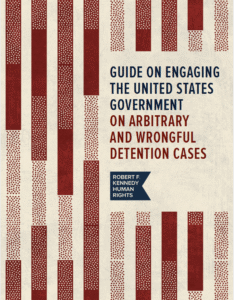October 15, 2015 | Washington – In an open letter to Mexican President Enrique Peña Nieto, Robert F. Kennedy Human Rights joins leading human rights figures to call on the Mexican government to expend maximum effort and commitment to determine the whereabouts of 43 students of a teacher-training college in Ayotzinapa who were forcibly disappeared on September 26 and 27, 2014 in Guerrero, Mexico.
A recent report by an international panel of independent experts, appointed by the Inter-American Commission on Human Rights through an agreement between the Mexican government and the students’ families and representatives, exposed grave procedural errors in the government’s investigation, including mishandled evidence and omitted testimonies. The group’s findings did not substantiate the federal Attorney General’s Office’s conclusions about the motive or methods of the crimes; on the contrary, the independent experts concluded that crucial aspects of the official hypothesis were scientifically impossible.
Considering the report’s worrying findings, this letter urges President Peña Nieto to implement all of the expert’s recommendations for the case. The letter urges the Mexican government to determine the whereabouts of the students, open new lines of investigation, interview members of the Mexican army who may have played a part in the crimes, guarantee quality and sustained attention to the victims, and resolve the issue of enforced disappearances in Mexico more broadly.
The letter also supports the victims’ families’ call for the mandate of the independent experts’ group to be extended for as long as necessary, keeping in mind that the government’s obligation is to clarify what happened to the disappeared students and to discover where they are, a task for which the continued participation of this group is crucial.
Robert F. Kennedy Human Rights and the signatories will continue to monitor the case of the Ayotzinapa students.
A copy of the letter follows below.
President Enrique Peña Nieto
Office of the President
Official Los Pinos Residence
The Republic of Mexico
Your Excellency,
We write to express our deep concern regarding the continued enforced disappearance of 43 students from the Raúl Isidro Burgos Normal Rural School of Ayotzinapa, and urge your government to expend maximum effort and commitment to determine their whereabouts and provide truth and justice for the victims, their families, and the Mexican people in this atrocious case.
We commend the recently released report of the Interdisciplinary Group of Independent Experts (GIEI), appointed by the Inter-American Commission on Human Rights (IACHR) in agreement with the students’ families and your government to look into the Ayotzinapa case. We also welcome your government’s consent to extend the group’s mandate. We support the families’ call for the mandate to be extended for as long as necessary, keeping in mind that the government’s obligation is to clarify what happened to the disappeared students and to discover where they are, a task for which the continued participation of the GIEI is crucial.
As you know from the report presented to your government, the GIEI uncovered troubling instances of multiple investigative errors, including mishandled evidence and omitted testimonies. The group’s findings did not substantiate the federal Attorney General’s Office’s conclusions about the motive or methods of the crimes; on the contrary, the GIEI concluded that crucial aspects of the official hypothesis were scientifically impossible. The GIEI found no compelling evidence to support the government’s main theory that the students were burned at the Cocula garbage dump. Additionally, the GIEI made it clear that there are further lines of investigation and other actors whose involvement needs to be fully clarified, including members of the Mexican army and other federal institutions. Furthermore, the report found that state and federal police as well as the Mexican army were aware of and present at various crimes scenes of the brutal, hours-long, and coordinated attack against the students, and yet did not intercede to protect the lives of their fellow citizens.
We understand that the Attorney General’s Office is analyzing the report to determine how to incorporate its findings into the government’s investigation. We strongly urge the Attorney General’s Office to include all aspects of the GIEI’s study, and to implement all of the experts’ recommendations. We especially urge the government to take the following actions:
- Continue the search for the students. Based on the available evidence, the GIEI was not able to ascertain the whereabouts of the students. Until the students are found, the case should be considered an open investigation into enforced disappearances.
- Re-orient the lines of investigation. To begin, a new investigative unit should be assigned to the case. A review of the motive for the crimes is essential, including examination of a possible connection with a fifth bus that may have been involved in the transportation of illicit drugs. Privately-owned and government-owned facilities where the students may have been brought should be investigated.
- Allow the GIEI to interview all authorities. Testimony is needed immediately from all authorities who were present during the incidents – including the Mexican army and federal police. For example, the group must be permitted to interview in person members of the 27th Infantry Battalion of the Mexican army, who may have played a role in the events that night.
- Guarantee quality attention to the victims. Implement the agreed-upon legal, social, psychological, and medical aid to the families. Consolidate communication mechanisms with the families. Strengthen witness-protection mechanisms.
- Resolve the issue of enforced disappearances in Mexico. Create a unified national registry of disappeared persons, integrated with the registry of the National System for Attention to Victims and standardized information on unidentified remains. Implement effective, unified protocols for both immediate searches and criminal investigations in all cases of potential enforced disappearance. The new General Law on Disappearances should incorporate the input of civil society and victims’ groups.
Over one year after their disappearance, the whereabouts of the students is still unknown, despite the Attorney General’s Office’s premature declaration that the “historical truth” on the case had been resolved. Much to the despair of the students’ families, their loved ones are still not home.
Further, in the investigation and search for the students over the last year, almost 300 other cases of disappearances in the Iguala area have surfaced. What is more, the government’s national registry of missing and disappeared persons currently contains over 25,000 cases of individuals who disappeared between 2007 and July 2015.
While we welcome your meeting with the victims’ families on September 24, we urge you to increase your government’s efforts on the case. It is imperative that your government exercise the utmost level of effort, resources, responsibility, care, and commitment to not only find the 43 students from Ayotzinapa, but also to put an end to the crisis of enforced disappearances and impunity for these crimes in Mexico.
We will continue to monitor the case of the Ayotzinapa students and the reports of widespread enforced disappearances in Mexico.
We thank you in advance for your attention towards the resolution of this serious matter.
Walter Albán
Lead Professor, Faculty of Law, Pontifical Catholic University of Peru
Juan Pablo Albán
Director of the Legal Clinic, Professor of International Law and Human Rights, School of Law, San Francisco University of Quito
Raquel Aldana
Associate Dean, Professor of Law, University of the Pacific, McGeorge School of Law
Philip G. Alston
John Norton Pomeroy Professor of Law, New York University School of Law
Roxanna Altholz
Assistant Clinical Professor, Berkeley Law, University of California
Thomas Antkowiak
Associate Professor of Law; Director, International Human Rights Clinic; Director, Latin America Program, Seattle University School of Law
Arturo Arias
Tomas Rivera Regents Professor in Latin American Literature, Department of Spanish and Portuguese, University of Texas at Austin
David Baluarte
Assistant Clinical Professor of Law, Director, Immigrant Rights Clinic, Washington and Lee University School of Law
Daniel M. Brinks
Co-Director, Bernard and Audre Rapoport Center for Human Rights and Justice, University of Texas at Austin
Tito Bracamonte
Executive Secretary, National Coordinator for Human Rights in Peru
Laurence Burgorgue-Larsen
Professor of Law, University of Paris Panthéon-Sorbonne
Santiago A. Canton
Executive Director, Partners for Human Rights, Robert F. Kennedy Human Rights
Lauren Carasik, Esq.
Clinical Professor of Law, Director, International Human Rights Clinic, Western New England University School of Law
Jessica Carvalho Morris
Executive Director, Conectas
Carlos Castresana Fernández
Public Prosecutor of the Supreme Court of Spain (on leave)
Gaston Chillier
Executive Director, Center for Legal and Social Studies (CELS)
Ernesto de la Jara Basombrío
Founding Director, Institute of Legal Defense (IDL), Peru
Connie de la Vega
Professor of Law and Academic Director of International Programs, University of San Francisco School of Law
Todd Eisenstadt
Professor, Department of Government, American University
Dr. Mark Ellis
Executive Director, International Bar Association
Karen Engle
Co-Director, Bernard and Audre Rapoport Center for Human Rights and Justice, University of Texas at Austin
Dra. Silvia Figueroa
Professor, Department of Law and International Relations, Monterrey Institute of Technology, Mexico
Martin Flaherty
Leitner Family Professor of International Human Rights Law Founding Co-Director, Leitner Center of International Law and Justice, Fordham Law School; Visiting Professor, Woodrow Wilson School of Public and International Affairs, Princeton University
Dr. Donald Frischmann
Professor of Spanish & Hispanic Studies
Texas Christian University
2000 & 2012 Fulbright-García Robles Research Scholar
Alejandro M. Garro
Professor of Law, Columbia Law School, Columbia University
Alejandra Gonza
Director, International Human Rights Clinic, University of Washington School of Law
Dr. Eduardo González Velázquez
Professor-Researcher, School of Humanities and Social Sciences, Monterrey Institute of Technology, Mexico
Lisa Haugaard
Executive Director, Latin America Working Group (LAWG)
John Heffernan
Executive Director, Speak Truth to Power, Robert F. Kennedy Human Rights
Shin Imai
Associate Professor, Osgoode Hall Law School; Director, Justice and Corporate Accountability Project, York University
Kerry Kennedy
President, Robert F. Kennedy Human Rights
Viviana Krsticevic
Executive Director, Center for Justice and International Law (CEJIL)
Frank La Rue
Director, Robert F. Kennedy Human Rights – Europe
Karim Lahidji
President, International Federation for Human Rights (FIDH)
Dr. Lucas Lixinski
Senior Lecturer, UNSW Law, University of New South Wales, Australia
David Lovatón Palacios
Lead Professor, Faculty of Law, Pontifical Catholic University of Peru
Helen Mack
President, Myrna Mack Foundation
Annette Martínez-Orabona
Executive Director, Instituto Caribeño de Derechos Humanos (ICADH)
Ruth W. Messinger
President, American Jewish World Service (AJWS)
Jennifer Moore
Member, the National Lawyer’s Committee on Human Rights, Peace Brigades International-USA
Lucia Nader
Fellow, Open Society Foundations (OSF)
Aryeh Neier
President Emeritus, Open Society Foundations (OSF)
Joy Olson
Executive Director, Washington Office on Latin America (WOLA)
John Packer
Director, Human Rights Research and Education Centre, University of Ottawa
Amelia Parker
Executive Director, Peace Brigades International – USA
Francisco J. Rivera Juaristi
Director, International Human Rights Clinic, Assistant Clinical Professor of Law, Santa Clara University School of Law
César Rodríguez Garavito
Executive Director, Center of Studies on Law, Justice and Society (“DeJusticia”)
Naomi Roht-Arriaza
Distinguished Professor of Law, Hastings College of the Law, University of California
Eric Rosenthal
Executive Director, Disability Rights International (DRI)
Macarena Saez
Faculty Director, Center for Human Rights and Humanitarian Law, American University Washington College of Law
Katya Salazar
Executive Director, Due Process of Law Foundation (DPLF)
Violeta Sandoval
Director of Training and Social Entrepreneurship, Monterrey Institute of Technology, Mexico
Miguel Sarre
Profesor, Mexican Autonomous Institute of Technology
James Silk
Clinical Professor of Law, Allard K. Lowenstein International Human Rights Clinic
Director, Orville H. Schell, Jr. Center for International Human Rights, Yale Law School
Gwynne Skinner
Director, International Human and Refugee Rights Clinic; Associate Professor of Law, Willamette University College of Law
Gerald Staberock
Secretary-General, World Organisation Against Torture (OMCT)
David Tolbert
President, International Center for Transitional Justice (ICTJ)
Rodrigo Uprimny Yepes
Researcher and Founding Member, Center of Studies on Law, Justice and Society (“DeJusticia”); Law Professor, National University of Colombia
José Miguel Vivanco
Director of the Americas Division, Human Rights Watch (HRW)”




